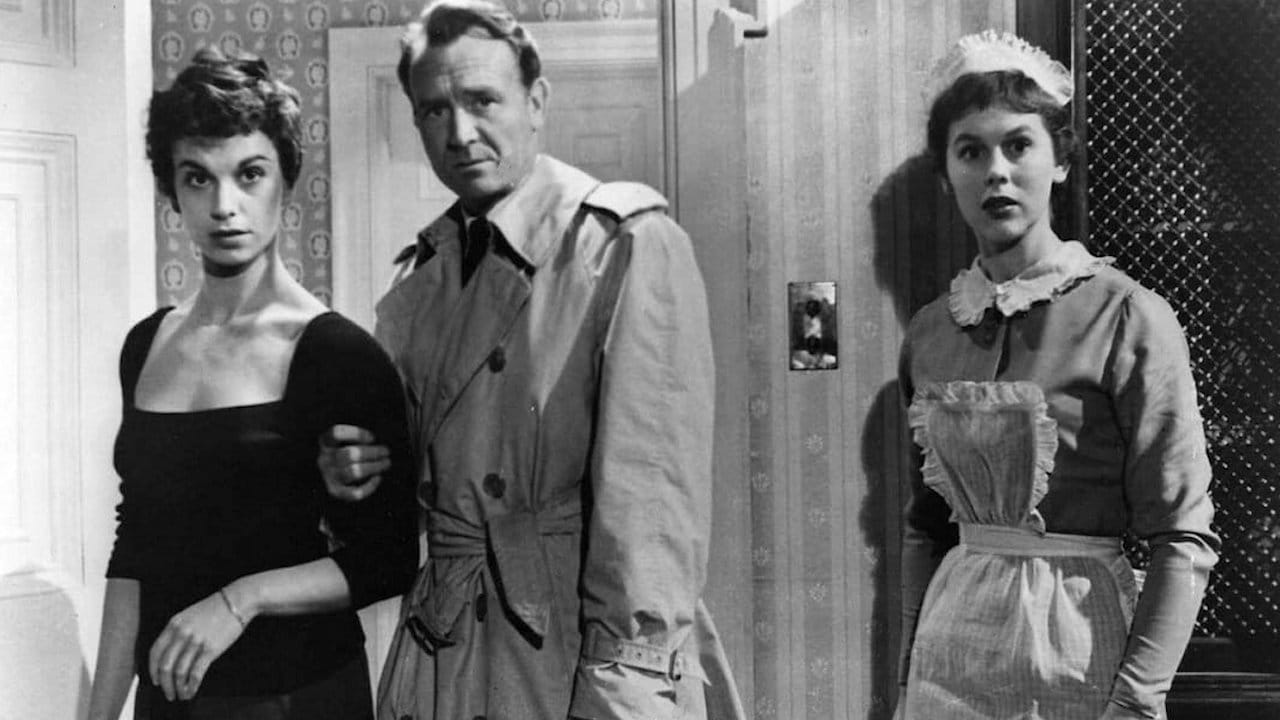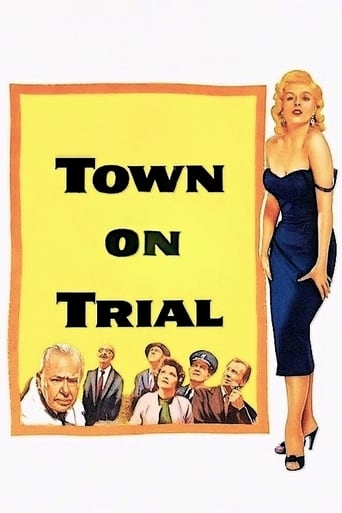



Sorry, this movie sucks
Good start, but then it gets ruined
Good idea lost in the noise
One of the most extraordinary films you will see this year. Take that as you want.
View MoreCopyright 1956 by Marksman Films Ltd. Released through Columbia Pictures Corp. No New York opening. U.S. release: August 1957. U.K. release: 18 February 1957. Australian release: 26 September 1957. 8,654 feet. 96 minutes. NOTES: "Introducing" Elizabeth Seal, although she had in fact previously appeared in Radio Cab Murder (1954). Producer: Maxwell Setton. Copyright 1956 by Marksman Films Ltd. Released through Columbia Pictures Corp. No New York opening. U.S. release: August 1957. U.K. release: 18 February 1957. Australian release: 26 September 1957. 8,654 feet. 96 minutes. COMMENT: You'd think a movie with a cast like this would more than fill the average suburban cinema of a Friday night. Mills, Coburn, Farr were all super-popular players. Farr had even recently played a most successful season on the stage, opposite his actress wife, Muriel Pavlow. But when I saw the movie at my neighborhood Odeon, I was one of only three paying patrons in the theatre! It wasn't only that television had already started to take its big bite out of cinema attendances, but that audiences simply didn't take to Mills as either a policeman or a murder suspect. To most picturegoers, Mills was a serviceman - whether in the army, navy or air force didn't matter, so long as he was in uniform. Out of uniform, he was barely tolerated as a businessman or farmer, completely ignored as either a light romantic figure or comedy cut-up or a disturbed "little man" with serious emotional problems. Thus general audiences chose to ignore all of Mills' best performances. Instead he was "ideally" cast as the epitome of breezy officer types, all-right chaps, stiff upper-lip and all that. A grippingly fast-paced, mystery thriller, Town on Trial is an original screenplay by Ken Hughes and Robert Westerby, written in the classic tradition of credibly-hewn characters, realistic incident and a bobby-dazzler of an action climax. There are only four suspects, yet the writers keep us in fine suspense right up to the climactic revelation. And although the identity of the killer is cleverly concealed, the script plays fair . John Guillermin has directed this fine script with verve, style and imagination. No doubt all the subjective camerawork is detailed in the script, but it's fascinatingly presented all the same. A large budget with lots of extras and location settings also helps. The performances are all major league. From the tantalising glimpse of Magda Miller, through the high-spirited sexiness of Elizabeth Seal, to the nastily vicious (?) or helpfully sincere (?) Charles Coburn who brings all his magnificent charisma to bear on a difficult role which he brings off so superbly. Production credits are likewise absolutely first-rate. Photography, music, film editing and art direction are especially commendable.
View MoreWith lust in their eyes,a group of men watch a nubile(not to say pleasingly plump) blonde playing genteel and wholesomely sexy tennis. Each of these will,in turn,be suspects when the unfortunate young woman gets murdered and Dept Supt Halloran from Scotland Yard - pause for a quick intake of breath - gets called in on the case. Messrs Derek Farr,Alec McCowen and Charles Coburn come immediately under his gaze,a Battle of Britain hero,a teenager(that alone was a crime in 1957 - believe me)and a doctor on the run from some sort of malpractice suit in Canada who has brought his niece along for company and so she can provide a little love interest for Supt Halloran. And here we have "Town on trial"'s greatest(and it has a few) weakness. No matter how much he leers,shouts and menaces,Mr John Mills is totally unconvincing as a tough Scotland Yard detective.He cajoles,he threatens,he lies,even,but he just doesn't cut it. Coppers in 1957 were big,bluff,Brylcreem tonsured men with broken noses and fists like hams who had cut their teeth on mean streets and didn't take any sh*t from anybody - indeed they were seldom offered it in a milieu where both sides of the law knew exactly where they stood. You murdered someone - you risked the rope.Halloran's suspects would all have known that. The thin veneer of respectability is stripped under the basilisk - like eye of Supt Halloran and eventually he gets his man,but not before another murder occurs. Tennis Club morals are vilified and the local teenage hangout,"The Hotspot"(it would probably be called "The 'G' Spot" nowadays) is shown as a den of mildly inappropriate behaviour("It's a rock and roll joint" says Harry Lock,amusing as a sartorially challenged detective). If you're in your seventies and want to remember when you wore a high - necked pullover and a tie to repair your motor - cycle and helmets were for Geoff Duke,you might find "Town on trial" diverting. If not it's a bit of social history that might be amusing.
View MoreI come out somewhere between these two last verdicts. The plot had more holes than a chunk of gruyere, motivations I'd agree were distinctly shaky, and chemistry between Mills and Barbara Bates as the girl he falls for was notably lacking. (Love scenes have never exactly been Johnny Mills's forte, have they?) But as so often with British films of this vintage, the portrayal of a particular era and social milieu is fascinating, and the supporting performances include some gems. I liked Derek Farr's increasingly sweaty reactions as the bogus ex-officer running the social club as his own little harem; initially loathsome, but gradually becoming a pitiable figure as his carefully-constructed social persona crumbles about his ears. And Elizabeth Seal turns in a tour de force as the respectable mayor's daughter going determinedly to the bad. Her spirited, bottom-wiggling solo dance at the club was utterly wonderful.
View MoreI too watched the Channel 4 showing. Must disagree with the previous comment. I thought it was a very mediocre film, especially when you think the story was penned by Francis Durbridge. As for the plot, well please tell what were the motives for the murders? I will agree, an excellent film to watch, if you are looking out for those great 'B' film character actors. ( uncredited appearance of Hal Osmond, then only 38, looking thirty years older). The petrol forecourt scene, and chastisement of Superintendent John Mills by the bicycling village 'plod' were great little scenes. Who was the actor who played the 'bobby'?
View More